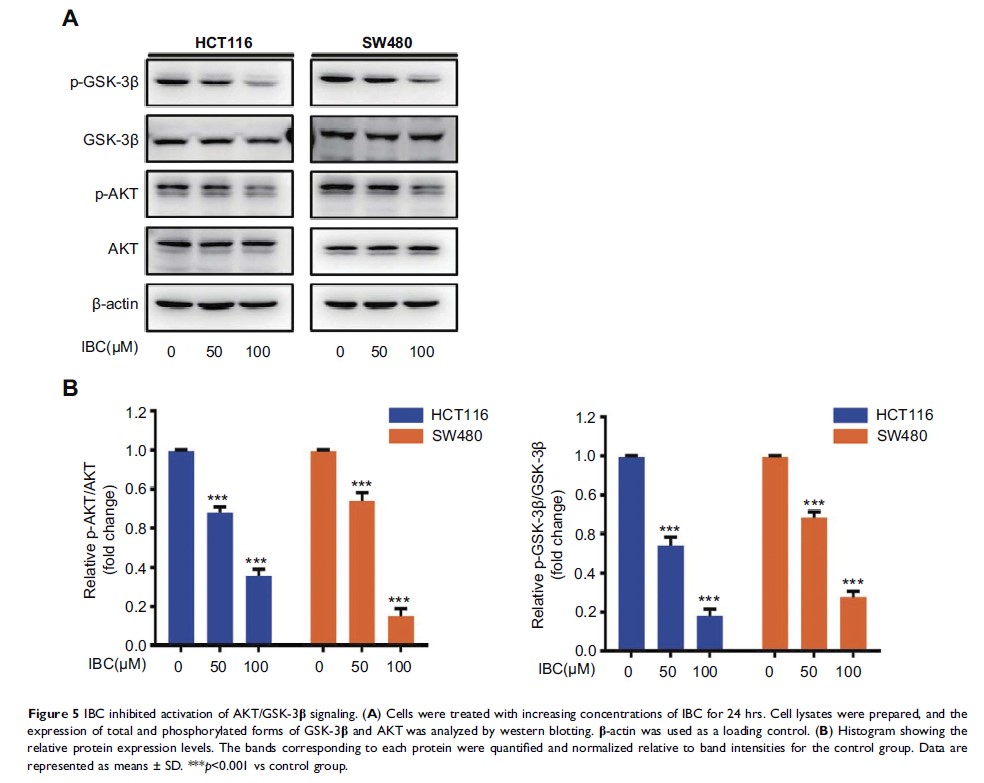9 1 2 3 6
论文已发表
注册即可获取德孚的最新动态
IF 收录期刊
- 2.6 Breast Cancer (Dove Med Press)
- 3.9 Clin Epidemiol
- 3.3 Cancer Manag Res
- 3.9 Infect Drug Resist
- 3.6 Clin Interv Aging
- 4.8 Drug Des Dev Ther
- 2.8 Int J Chronic Obstr
- 8.0 Int J Nanomed
- 2.3 Int J Women's Health
- 3.2 Neuropsych Dis Treat
- 4.0 OncoTargets Ther
- 2.2 Patient Prefer Adher
- 2.8 Ther Clin Risk Manag
- 2.7 J Pain Res
- 3.3 Diabet Metab Synd Ob
- 4.3 Psychol Res Behav Ma
- 3.4 Nat Sci Sleep
- 1.9 Pharmgenomics Pers Med
- 3.5 Risk Manag Healthc Policy
- 4.5 J Inflamm Res
- 2.3 Int J Gen Med
- 4.1 J Hepatocell Carcinoma
- 3.2 J Asthma Allergy
- 2.3 Clin Cosmet Investig Dermatol
- 3.3 J Multidiscip Healthc

从豆科植物补骨脂中分离的异巴伐他酮通过遏制结直肠癌细胞中的 AKT/GSK-3β/β-连环蛋白通路抑制细胞增殖并诱导细胞凋亡
Authors Li Y, Qin X, Li P, Zhang H, Lin T, Miao Z, Ma S
Received 30 October 2018
Accepted for publication 8 March 2019
Published 1 May 2019 Volume 2019:13 Pages 1449—1460
DOI https://doi.org/10.2147/DDDT.S192681
Checked for plagiarism Yes
Review by Single-blind
Peer reviewers approved by Dr Cristina Weinberg
Peer reviewer comments 2
Editor who approved publication: Prof. Dr. Cristiana Tanase
Background: Colorectal
cancer (CRC) is a common form of cancer associated with a high mortality rate
and poor prognosis. Given the limited efficacy of current therapies for CRC,
interest in novel therapeutic agents isolated from natural sources has
increased. We studied the anticancer properties of isobavachalcone (IBC), a
flavonoid isolated from the herb Psoralea corylifolia , which is used in traditional
Chinese medicine, in an in vitro model of CRC.
Materials and methods: Cell
viability and growth of CRC cells were determined by Cell Counting Kit-8 and
colony formation assays following treatment with varying concentrations of IBC,
respectively. Apoptosis was examined by 4′,6-diamidino-2-phenylindole staining
and flow cytometry with Annexin V/propidium iodide double staining. Western
blot analysis was used to analyze expression of apoptosis-associated protein
pathway and the AKT/GSK-3β/β-catenin signaling pathway.
Results: Initial
experiments showed that IBC inhibited proliferation and colony formation of human
CRC cell lines in dose- and time-dependent manners. The antiproliferative
effect of IBC resulted from induction of apoptosis, as evidenced by
morphological changes in the nucleus, flow cytometry analysis, upregulation of
cleaved caspase-3 and cleaved PARP, changes in the ratio of the anti-apoptotic
protein Bcl-2 and the pro-apoptotic protein Bax, translocation of Bax from the
cytosol to the mitochondria, and decreased expression of two inhibitors of
apoptosis family proteins, XIAP, and survivin. Western blot analysis of
signaling pathway proteins demonstrated that IBC downregulated Wnt/β-catenin
signaling, which has previously been associated with CRC, by inhibiting the
AKT/GSK-3β signaling pathway.
Conclusion: This
study demonstrated that IBC inhibited cell proliferation and induced apoptosis
through inhibition of the AKT/GSK-3β/β-catenin pathway in CRC. These results
suggest the potential of IBC as a novel therapeutic agent for the treatment of
CRC.
Keywords: colorectal
cancer, isobavachalcone, apoptosis, AKT, GSK-3β, β-catenin signalling
